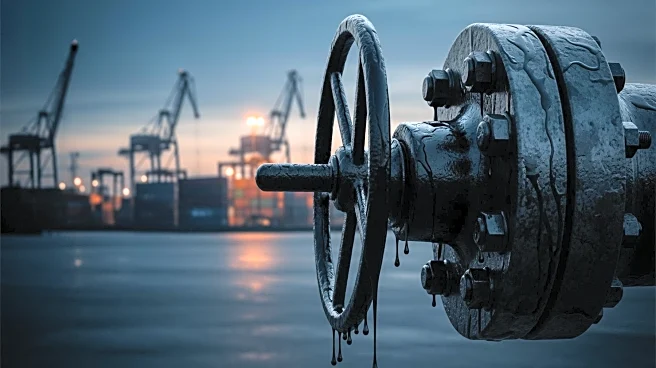What's Happening?
A significant drone strike by Ukrainian forces has led to the suspension of oil shipments at Russia's largest Black Sea port, Novorossiysk. The attack, which occurred overnight on November 14, targeted
the Sheskharis oil-loading terminal, causing extensive damage to pipeline infrastructure and pumping systems. The strike was reportedly carried out by Ukraine's Security Service special forces, along with other military units, and resulted in a large fire at the terminal. The attack also damaged S-300/400 air-defense positions, leading to secondary explosions. The Sheskharis facility, operated by Transneft, is a major hub for Russia's seaborne oil exports, handling a significant portion of Urals crude shipments. The drone strike also affected civilian areas, with debris damaging a vessel and several apartment buildings, injuring multiple individuals.
Why It's Important?
The suspension of oil shipments from Novorossiysk represents a strategic blow to Russia's economy, as the terminal is crucial for exporting crude oil and refined products. This disruption could significantly impact Russia's oil revenue, which is vital for funding its military operations. The attack underscores Ukraine's capability to target key infrastructure, potentially altering the dynamics of the ongoing conflict. The damage to air-defense systems further highlights vulnerabilities in Russia's military defenses. The broader implications include potential shifts in global oil markets, as disruptions in Russian oil exports could affect supply and prices internationally. Additionally, the attack may escalate tensions between Russia and Ukraine, influencing diplomatic and military strategies.
What's Next?
The immediate focus will likely be on assessing and repairing the damage at the Novorossiysk terminal to resume oil shipments. Russia may increase its defensive measures to protect critical infrastructure from future attacks. The incident could prompt international discussions on energy security and the stability of oil markets. Ukraine may continue targeting strategic sites to weaken Russia's economic and military capabilities. The situation may lead to heightened military responses from Russia, potentially affecting regional security dynamics. Stakeholders, including oil companies and governments, will be monitoring developments closely to mitigate potential disruptions in energy supply.
Beyond the Headlines
The attack on Novorossiysk highlights the evolving nature of warfare, where non-traditional tactics like drone strikes play a significant role. This development raises ethical and legal questions about the use of drones in conflict, particularly regarding civilian safety and infrastructure protection. The incident may influence future military strategies, emphasizing the need for advanced defense systems against unmanned aerial threats. Long-term, the conflict could drive innovation in drone technology and countermeasures, impacting military procurement and defense policies globally.










